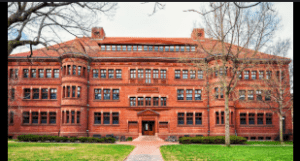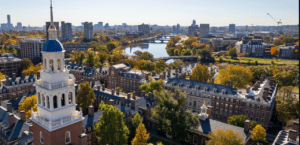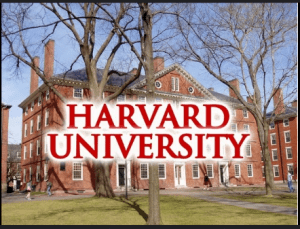Massachusetts: In a historic and contentious move that signals a dramatic escalation of federal involvement in the governance of higher education, the United States government—acting under the continued influence of policies championed by former President Donald J. Trump—has frozen over $2.2 billion in federal grants and contracts earmarked for Harvard University. This sweeping action, unprecedented in its scale and implications, stems from Harvard’s refusal to adopt a series of controversial policy directives issued by the Trump-era Department of Education. These mandates sought sweeping reforms related to campus governance, student activism, and institutional diversity frameworks—elements long considered foundational to the university’s academic culture and operational autonomy.
The move comes in the wake of increasing tensions over the role of government in shaping higher education, with critics charging that the freeze represents a significant overreach by the federal government. Harvard, a prestigious institution known for its commitment to academic freedom and intellectual independence, has long defended its policies and priorities, including its commitment to diversity and inclusion, as essential to maintaining a robust learning environment. However, the federal government’s action sends a stark message that universities must align with specific ideological frameworks or face severe financial consequences.
According to sources within the administration, the freeze is intended to serve both as a punitive measure and as a warning to other higher education institutions that resist federal oversight. The move has sparked immediate backlash from legal experts, civil rights advocates, and academic leaders, who argue that the federal government is leveraging financial resources to impose ideological conformity and infringe upon constitutionally protected freedoms within the academic sphere. Critics argue that this constitutes a blatant violation of academic freedom, undermining the autonomy of educational institutions and threatening the diversity of thought that has traditionally been a hallmark of American higher education.
As the situation unfolds, political analysts and educators alike are calling it a defining confrontation in the broader struggle between centralized governmental authority and the traditional independence of American universities. The implications of this battle extend beyond Harvard alone, touching on fundamental questions about the role of government in higher education, the scope of academic freedom, and the protection of rights within academic spaces. This high-stakes conflict could set a powerful precedent, influencing not only the future of Harvard University but also the governance and values of institutions of higher learning across the nation, potentially shaping the very structure of American education for generations to come.
Harvard University’s Legacy of Excellence and Global Influence
Harvard University, founded in 1636, stands as one of the oldest and most prestigious academic institutions in the world. Located in the historic city of Cambridge, Massachusetts, it has earned a reputation for academic rigor, innovation, and intellectual leadership. As a hallmark of excellence, Harvard consistently ranks among the top universities globally and is often seen as the gold standard in higher education. Over its centuries-long history, it has produced countless distinguished alumni, including U.S. presidents, Nobel laureates, business magnates, and thought leaders who have shaped the world in profound ways.


Its robust network of alumni, researchers, and thinkers continues to shape the future, ensuring that Harvard remains a symbol of intellectual prestige, a place where ideas flourish, and a critical force in the shaping of global policy and progress.
Backdrop: A Conflict Years in the Making
The mounting friction between elite academic institutions and the Trump-era political apparatus has been developing gradually over the past several years. However, the situation reached an inflection point when the U.S. Department of Education—under the continued influence of Trump-aligned leadership—issued a sweeping and controversial directive targeting Harvard University and several of its Ivy League counterparts. The directive outlined a strict set of conditions as prerequisites for the continuation of federal financial support, effectively tying billions in research grants, operational funding, and student aid to specific ideological and administrative reforms.
Among the most contentious demands was the complete dismantling of Diversity, Equity, and Inclusion (DEI) programs—initiatives that Harvard and other universities have long considered central to their missions of fostering inclusive, multicultural learning environments. Trump-era officials criticized these programs as divisive and ideologically biased, claiming they contributed to a culture of exclusion rather than integration, particularly for conservative students.
The directive also called for a sweeping overhaul of admissions practices, with the administration alleging entrenched ideological bias in the selection process. It specifically targeted legacy admissions and affirmative action policies, demanding greater transparency and a move toward what it termed “ideologically neutral” criteria—part of a broader campaign to dismantle what Trump officials described as elite liberal orthodoxy in academia.
Further, the directive proposed sharp restrictions on campus activism, including a controversial ban on mask-wearing during protests, which the administration linked to security risks and the rise of anonymous radicalism. Pro-Palestinian student organizations were singled out for heightened oversight, with federal authorities citing concerns over the spread of extremism and campus unrest during global geopolitical crises.
Perhaps most controversially, the directive included a demand for enhanced collaboration with federal immigration enforcement, requiring universities to share data and increase compliance in cases involving international students—a move critics say violates privacy rights and undermines the global openness that defines institutions like Harvard.
Supporters of these policies within the Trump camp have defended them as necessary to “rebalance the ideological ecosystem” of higher education, which they argue has been disproportionately influenced by liberal and progressive narratives. In their view, this campaign for reform is a matter of restoring free speech, political diversity, and national values across America’s most powerful intellectual institutions.
Harvard’s Defiant Response
In the face of mounting federal pressure, Harvard University—widely regarded as one of the world’s premier academic institutions and a longstanding emblem of intellectual independence—issued a resolute rejection of the demands levied by the Trump-aligned Department of Education. The university’s stance was formalized in a letter authored by Interim President Alan Garber, addressed directly to federal officials, in which Harvard unequivocally refused to comply with what it described as coercive and ideologically charged mandates.
“We reject any attempt by the federal government to use financial coercion to undermine the integrity of our academic environment,” Garber wrote. “Harvard remains committed to fostering free inquiry, inclusion, and the protection of all members of our community.”
The statement marked one of the strongest rebukes yet by a major academic institution in response to federal overreach, emphasizing Harvard’s dedication to preserving academic freedom, intellectual pluralism, and its historic role as a bastion of democratic values. The university framed the administration’s demands as an assault not only on institutional autonomy but also on the broader principle of educational independence in a democracy.
At the same time, Harvard took the opportunity to reaffirm its active commitment to addressing antisemitism, Islamophobia, racism, and all forms of discrimination—issues that have been the subject of intense national debate. However, the university criticized what it called a “selective and politically motivated” interpretation of civil rights enforcement—suggesting that the administration’s approach was less about upholding equality and more about targeting perceived ideological adversaries.
This defiance positions Harvard not only as a central figure in the legal and ideological battle unfolding across the academic landscape, but also as a symbol of resistance against what many view as the politicization of federal educational oversight. It also sends a powerful message to peer institutions facing similar scrutiny: that institutional values and academic integrity may, at times, require direct confrontation with political authority.
Immediate Impact: Operational Strain and Legal Pushback
The abrupt freeze of over $2.2 billion in federal funding has sent shockwaves through Harvard University’s administrative and academic infrastructure, triggering immediate operational strain and prompting swift legal action. The withheld funds include a broad array of federal grants and research contracts—many of which support groundbreaking scientific initiatives, public health programs, and essential student services. The freeze threatens not only the university’s financial stability but also its continued leadership in global research and innovation.


-
A university-wide hiring freeze, affecting both faculty appointments and administrative positions, in an effort to conserve financial resources across departments.
-
An internal audit of resource allocation, launched to assess and reprioritize funding for essential operations and to prepare contingency plans for a sustained budgetary shortfall.
-
The filing of a federal lawsuit, spearheaded by the Harvard Faculty Association in collaboration with multiple national civil liberties organizations, including the American Civil Liberties Union (ACLU) and the Foundation for Individual Rights and Expression (FIRE).
The legal complaint accuses the U.S. Department of Education and affiliated agencies of unlawful political interference in academic governance, asserting that the Trump-aligned leadership is manipulating civil rights law—specifically Title VI of the Civil Rights Act of 1964—to suppress ideological dissent and stifle constitutionally protected forms of expression.
The plaintiffs argue that Title VI, originally intended to prohibit discrimination on the basis of race, color, or national origin in programs receiving federal assistance, is being weaponized as a political tool to penalize universities for accommodating progressive student movements and upholding inclusive academic policies. The lawsuit contends that the federal government’s actions violate the First Amendment rights of both students and faculty, and represent a dangerous precedent for politicizing educational oversight.
As legal proceedings begin, Harvard’s leadership has reaffirmed its stance that defending academic freedom—no matter the cost—is not only a constitutional necessity but a moral obligation.
Conclusion: A Defining Battle Over Autonomy and Ideology
The ongoing legal and political battles surrounding Harvard University have become emblematic of a larger ideological war that is reshaping the landscape of higher education in the United States. At the heart of this conflict is the controversial freezing of Harvard’s $2.2 billion in funding, a dramatic and unprecedented move by the federal government. This act, considered one of the most aggressive actions ever taken against an American university, highlights the intensifying struggle over the intersection of academic freedom, federal oversight, and political ideology.
 This battle is not merely about a single institution, but rather represents a broader cultural and political clash over what role universities should play in fostering free inquiry and promoting ideologies that align with the current political climate. Harvard, historically regarded as a bastion of academic independence, now finds itself at the forefront of this ideological battle, as its academic and administrative choices are under intense scrutiny. The freezing of its funding signals a direct challenge to the autonomy of academic institutions and sets a potentially dangerous precedent for future federal intervention in the operations of universities across the nation.
This battle is not merely about a single institution, but rather represents a broader cultural and political clash over what role universities should play in fostering free inquiry and promoting ideologies that align with the current political climate. Harvard, historically regarded as a bastion of academic independence, now finds itself at the forefront of this ideological battle, as its academic and administrative choices are under intense scrutiny. The freezing of its funding signals a direct challenge to the autonomy of academic institutions and sets a potentially dangerous precedent for future federal intervention in the operations of universities across the nation.
On the other side, critics argue that this is a necessary response to what they perceive as an overreach by universities in promoting certain political ideologies, suggesting that federal involvement may be required to maintain a balance of power and to ensure that taxpayer money is not being used to support institutions that undermine democratic values or engage in politically biased practices. This tension is likely to escalate, as various stakeholders, including lawmakers, educators, students, and activists, engage in fierce debates over how much influence the government should wield in the realm of education.
As the situation unfolds, the implications for both academic freedom and federal power are profound. This conflict may set the stage for future legislation, legal decisions, and political movements that will shape the way higher education operates in the United States for years to come. Whether this marks the beginning of a more authoritarian approach to governing educational institutions, or a reaffirmation of the independence that has long been the hallmark of American universities, remains to be seen.
For continuing coverage and updates on this developing story, visit the Wall Street Journal’s full report.
For more real time updates, visit Channel 6 Network.

